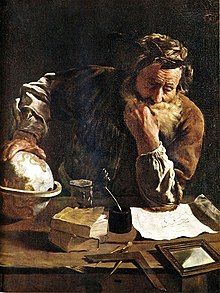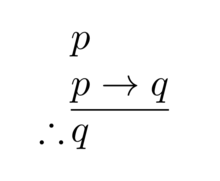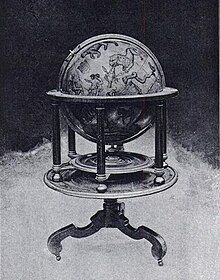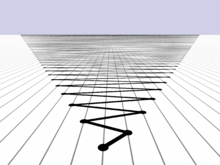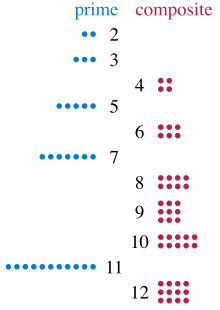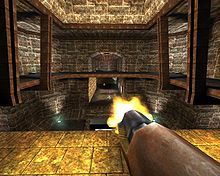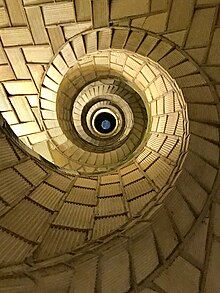Portal:Mathematics
The Mathematics Portal
Mathematics is the study of representing and reasoning about abstract objects (such as numbers, points, spaces, sets, structures, and games). Mathematics is used throughout the world as an essential tool in many fields, including natural science, engineering, medicine, and the social sciences. Applied mathematics, the branch of mathematics concerned with application of mathematical knowledge to other fields, inspires and makes use of new mathematical discoveries and sometimes leads to the development of entirely new mathematical disciplines, such as statistics and game theory. Mathematicians also engage in pure mathematics, or mathematics for its own sake, without having any application in mind. There is no clear line separating pure and applied mathematics, and practical applications for what began as pure mathematics are often discovered. (Full article...)
Featured articles –
Selected image –
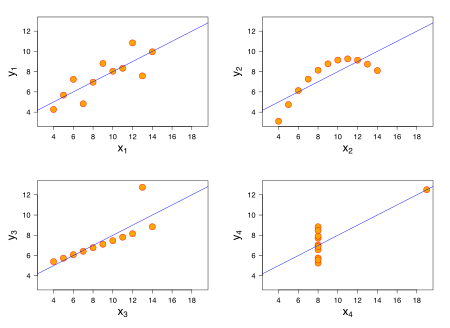
Good articles –
Did you know (auto-generated) –

- ... that despite a mathematical model deeming the ice cream bar flavour Goody Goody Gum Drops impossible, it was still created?
- ... that the music of math rock band Jyocho has been alternatively described as akin to "madness" or "contemplative and melancholy"?
- ... that after Florida schools banned 54 mathematics books, Chaz Stevens petitioned that they also ban the Bible?
- ... that more than 60 scientific papers authored by mathematician Paul Erdős were published posthumously?
- ... that the word algebra is derived from an Arabic term for the surgical treatment of bonesetting?
- ... that The Math Myth advocates for American high schools to stop requiring advanced algebra?
- ... that people in Madagascar perform algebra on tree seeds in order to tell the future?
- ... that multiple mathematics competitions have made use of Sophie Germain's identity?
More did you know –

- ...that Ostomachion is a mathematical treatise attributed to Archimedes on a 14-piece tiling puzzle similar to tangram?
- ...that some functions can be written as an infinite sum of trigonometric polynomials and that this sum is called the Fourier series of that function?
- ...that the identity elements for arithmetic operations make use of the only two whole numbers that are neither composites nor prime numbers, 0 and 1?
- ...that as of April 2010 only 35 even numbers have been found that are not the sum of two primes which are each in a Twin Primes pair? ref
- ...the Piphilology record (memorizing digits of Pi) is 70000 as of Mar 2015?
- ...that people are significantly slower to identify the parity of zero than other whole numbers, regardless of age, language spoken, or whether the symbol or word for zero is used?
- ...that Auction theory was successfully used in 1994 to sell FCC airwave spectrum, in a financial application of game theory?
Selected article –
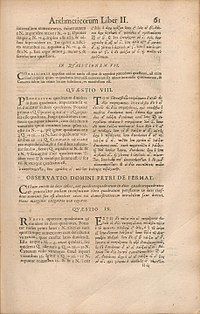 |
| Problem II.8 in the Arithmetica by Diophantus, annotated with Fermat's comment, which became Fermat's Last Theorem Image credit: |
Fermat's Last Theorem is one of the most famous theorems in the history of mathematics. It states that:
- has no solutions in non-zero integers , , and when is an integer greater than 2.
Despite how closely the problem is related to the Pythagorean theorem, which has infinite solutions and hundreds of proofs, Fermat's subtle variation is much more difficult to prove. Still, the problem itself is easily understood even by schoolchildren, making it all the more frustrating and generating perhaps more incorrect proofs than any other problem in the history of mathematics.
The 17th-century mathematician Pierre de Fermat wrote in 1637 in his copy of Bachet's translation of the famous Arithmetica of Diophantus: "I have a truly marvelous proof of this proposition which this margin is too narrow to contain." However, no correct proof was found for 357 years, until it was finally proven using very deep methods by Andrew Wiles in 1995 (after a failed attempt a year before). (Full article...)
| View all selected articles |
Subcategories

Algebra | Arithmetic | Analysis | Complex analysis | Applied mathematics | Calculus | Category theory | Chaos theory | Combinatorics | Dynamical systems | Fractals | Game theory | Geometry | Algebraic geometry | Graph theory | Group theory | Linear algebra | Mathematical logic | Model theory | Multi-dimensional geometry | Number theory | Numerical analysis | Optimization | Order theory | Probability and statistics | Set theory | Statistics | Topology | Algebraic topology | Trigonometry | Linear programming
Mathematics | History of mathematics | Mathematicians | Awards | Education | Literature | Notation | Organizations | Theorems | Proofs | Unsolved problems
Topics in mathematics
| General | Foundations | Number theory | Discrete mathematics |
|---|---|---|---|
| |||
| Algebra | Analysis | Geometry and topology | Applied mathematics |
Index of mathematics articles
| ARTICLE INDEX: | |
| MATHEMATICIANS: |
Related portals
WikiProjects
![]() The Mathematics WikiProject is the center for mathematics-related editing on Wikipedia. Join the discussion on the project's talk page.
The Mathematics WikiProject is the center for mathematics-related editing on Wikipedia. Join the discussion on the project's talk page.
In other Wikimedia projects
The following Wikimedia Foundation sister projects provide more on this subject:
-
Commons
Free media repository -
Wikibooks
Free textbooks and manuals -
Wikidata
Free knowledge base -
Wikinews
Free-content news -
Wikiquote
Collection of quotations -
Wikisource
Free-content library -
Wikiversity
Free learning tools -
Wiktionary
Dictionary and thesaurus



